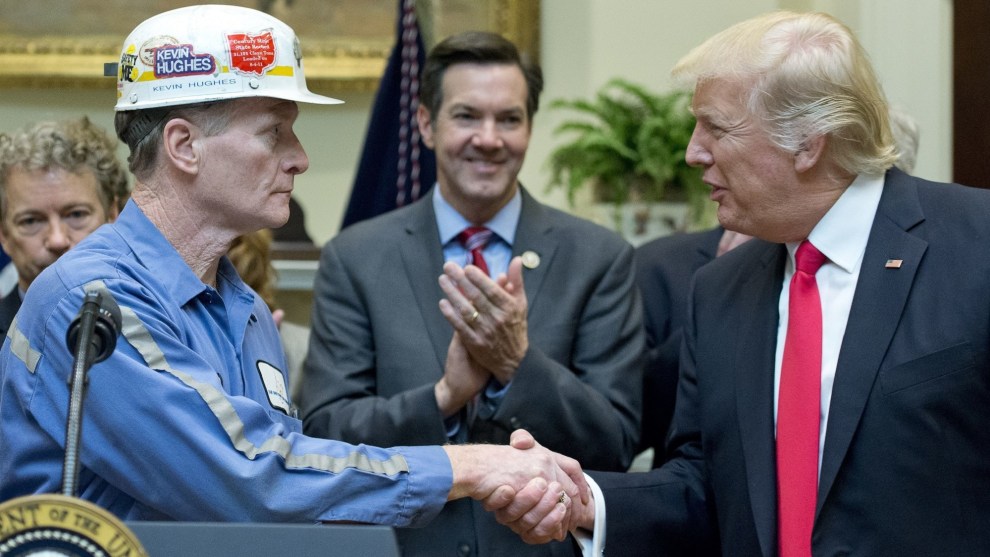 Millions of words have been published about Donald Trump’s feud with the Justice Department over the Mueller investigation. Little is being written about another way in which DOJ is thwarting the president’s will: the ongoing prosecution of foreign bribery.
Millions of words have been published about Donald Trump’s feud with the Justice Department over the Mueller investigation. Little is being written about another way in which DOJ is thwarting the president’s will: the ongoing prosecution of foreign bribery.
Starting before he became a candidate for the White House, Trump has railed against the Foreign Corrupt Practices Act, the 1977 law that allows for both civil and criminal cases to be brought against officials that engage in bribery and related practices committed anywhere in the world as long as their company does business in or has securities trading in the United States. He continued to complain about FCPA’s supposed unfairness after taking office.
These complaints seem to have had little effect on DOJ or on the Securities and Exchange Commission, which enforces the civil side of the law. Data collected for Violation Tracker, including a forthcoming update, show that since Trump took office DOJ and SEC have announced more than a dozen case resolutions with total penalties of more than $1.5 billion.
Several of those resolutions have been announced during the past two months. In early July DOJ and SEC each announced cases with combined penalties of $76 million against Credit Suisse and one of its subsidiaries for improperly winning banking business by giving jobs to family members and friends of Chinese government officials. Just the other day, the SEC announced that the French pharmaceutical company Sanofi would pay $25 million to resolve allegations that its subsidiaries in Kazakhstan and the Middle East made corrupt payments to win business.
It is true that many of the cases announced under Trump have involved foreign companies. Others include Japan’s Panasonic, Sweden’s Telia, and Canada’s Kinross Gold. Yet the culprits have also included some U.S.-based companies. Last year, for example, Halliburton had to pay $29 million to resolve allegations relating to its actions in Angola. Earlier this year, Dun & Bradstreet paid $9 million in connection with two of its subsidiaries in China. Most recently, investment manager Legg Mason agreed to pay more than $34 million to settle allegations that one of its subsidiaries was involved in a scheme to bribe officials in Libya.
While DOJ and SEC seem to be carrying out their mission of investigating FCPA violations by a wide range of companies, it remains to be seen whether that includes the Trump Organization, which according to various media reports may have corrupt practices act liability in a variety of countries (see, for example, The New Yorker piece on Azerbaijan).
This may be another test of whether Trump – and his business interests – are exempt from the law, but for now it is good to see that Trump has not succeeded in undermining an important tool in prosecuting other corporate bad actors.
 The Trump Administration has left little doubt that one of its main missions is to roll back the regulatory initiatives of the Obama years, especially the Clean Power Plan and the Consumer Financial Protection Bureau. Although Trump has been less overt about it, his corporate-friendly approach also includes weakening rules that have been around for decades.
The Trump Administration has left little doubt that one of its main missions is to roll back the regulatory initiatives of the Obama years, especially the Clean Power Plan and the Consumer Financial Protection Bureau. Although Trump has been less overt about it, his corporate-friendly approach also includes weakening rules that have been around for decades. The Trump Administration likes to play with fire. Now it may be playing with a fire-resistant material that is also a deadly carcinogen. After years of receding as a public health threat, asbestos could make a comeback.
The Trump Administration likes to play with fire. Now it may be playing with a fire-resistant material that is also a deadly carcinogen. After years of receding as a public health threat, asbestos could make a comeback. In the early days of the Trump era, there was
In the early days of the Trump era, there was  Donald Trump got elected in 2016 essentially by promising everything to everyone except immigrants and environmentalists. In the economic realm he vowed to resurrect dying industries such as coal, to achieve trade supremacy over the rest of the world, to dismantle the regulatory state, and to bring about growth rates not seen for decades. Now those corporate executives who sold their soul to Trump are realizing he cannot deliver on all those promises.
Donald Trump got elected in 2016 essentially by promising everything to everyone except immigrants and environmentalists. In the economic realm he vowed to resurrect dying industries such as coal, to achieve trade supremacy over the rest of the world, to dismantle the regulatory state, and to bring about growth rates not seen for decades. Now those corporate executives who sold their soul to Trump are realizing he cannot deliver on all those promises. Donald Trump seems to live in a world in which there is global trade but no foreign direct investment. He recently denounced BMW imports at a South Carolina rally while ignoring the German automaker’s production facility a short distance away in Spartanburg, which has been in operation since 1994.
Donald Trump seems to live in a world in which there is global trade but no foreign direct investment. He recently denounced BMW imports at a South Carolina rally while ignoring the German automaker’s production facility a short distance away in Spartanburg, which has been in operation since 1994. Donald Trump’s blue-collar supporters may like what they are seeing on Fox News, but when they arrive at work the MAGA revolution is nowhere to be found. Far from empowering labor, the Trump Administration’s employment policies are heavily skewed toward management.
Donald Trump’s blue-collar supporters may like what they are seeing on Fox News, but when they arrive at work the MAGA revolution is nowhere to be found. Far from empowering labor, the Trump Administration’s employment policies are heavily skewed toward management. Donald Trump and the rightwing fringe never tire of talking about supposed deep state plots. Yet if there is any conspiracy going on, it is the seeming attempt to remove any checks on the power of large corporations.
Donald Trump and the rightwing fringe never tire of talking about supposed deep state plots. Yet if there is any conspiracy going on, it is the seeming attempt to remove any checks on the power of large corporations. “Yesterday was not a good day for Novartis.” That’s what the chief executive of the pharmaceutical giant
“Yesterday was not a good day for Novartis.” That’s what the chief executive of the pharmaceutical giant  There have been times during the past 14 months when some people might have been tempted to regard big business as part of the anti-Trump resistance, based on the public stances that some chief executives have taken in response to the president’s more outrageous statements. A new
There have been times during the past 14 months when some people might have been tempted to regard big business as part of the anti-Trump resistance, based on the public stances that some chief executives have taken in response to the president’s more outrageous statements. A new
You must be logged in to post a comment.